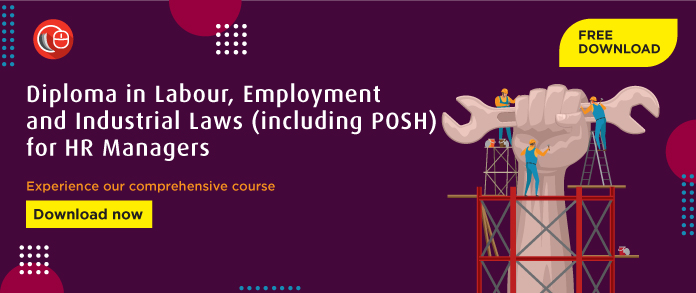This article is written by Sahaja, from NALSAR University of Law, Hyderabad. It explains the troubles faced by ex-convicts in finding jobs and how this is presently tackled in India.
Table of Contents
Introduction
Offenders encounter several social, economic, and personal hurdles following their release from jail, which often becomes an impediment to living a crime-free life. It is common for the release to be more severe than the prison sentence itself. Faced with stigma, rejection, distrust, mistrust, and discrimination the ex-prisoners need tenacity and support to face society and make it past these hurdles. While there was a lot of focus on reducing jail capacity by releasing prisoners during the COVID-19 lockdown, there was little focus on handling the release and post-release difficulties.
In India, some of the released prisoners experience unique obstacles such as villagers’ rejection, a lack of housing and transportation, and a lack of food. Moreover, there are no halfway houses in India, and most states do not provide any kind of rehabilitation assistance. Only the wages gained by working in rehabilitation homes keep a few people afloat. Some prisoner families are hesitant to add another dependent to their household due to the surrounding stigma. The coronavirus epidemic has exacerbated the difficulties of re-entry.
Ex-convicts and unemployment
Most people who are released from prison had a job prior to their incarceration and wish to return to it once they are free. According to certain criminal justice studies, finding and keeping legitimate employment can minimise recidivism, and the higher the salary, the less likely people are to return to crime. However, the majority of former inmates have trouble obtaining work after their release. Many people lose their employment skills and have few opportunities to get relevant work experience while in prison.
A considerable number of former inmates have low educational attainment and work experience, as well as health issues and other personal qualities that make them difficult to hire.
Stigma is defined as ‘a fundamentally disparaging attribute’ that can disrupt social and personal connections and modify them via the stigma theory’s perspective. People with a criminal record are stigmatised, making them vulnerable to being misinterpreted as untrustworthy, dangerous, and cruel. As a result, they may be treated with hostility, fear, and social isolation or marginalisation, making it difficult for them to find work.
Factors that make it hard for ex-convicts to find work
Why is it difficult for ex-convicts to find jobs and get employed? Many factors affect the employment prospects of prisoners once they finish their sentences and return to the outside world. There are many reasons as to why they are not employed and sometimes not even considered for employment.
Limited education and cognitive skills
Long jail terms and prison sentences, whereby the offender cannot stay in touch with the skills that he or she possessed before going into prison affect their cognitive thinking. Most prisoners have stable jobs before going into prison, and being away for a long time from their job and not being able to hone their skills in prison makes them inefficient and unsuitable for the same job that they possessed skills for.
Some offenders are sent to prison at a young age and have to serve long jail terms before they can be let out. Such prisoners go to jail when they are teens or in their early twenties and are released after many years when they start looking for jobs. During this period they miss out on the formative years of their life when they need to pursue studies in colleges. Since most prison systems do not have educational training and the courses offered in prison are limited, the prisoners lack the education and the ability to look for suitable jobs. Thus, there is limited education received and cognitive thinking capacity in prison is diminished.
Limited work experience
Most job recruiters or companies demand work experience to decide and choose the one who is fit for the job that is being offered. For an ex-convict, this is one of the most important hurdles as he or she has limited recent work experience. The work experience attained in prison or before being incarcerated is usually negligible and does not serve the purpose as the skills possessed then would have perished. The work experience that they might have accumulated before going to prison would not serve the purpose of the jobs in the present day if many years have passed by as the market would have evolved and will have different demands. As a result, if and when individuals try to reenter the job market after being incarcerated, their weak skills and lack of work experience limit their employability and earnings potential.
Substance abuse and physical/mental health problems
When ex-convicts are released from prison, they are in a vulnerable position as they are usually mistreated by their own families and the people outside. Some of such prisoners get subjected to substance abuse which they might or might not have practised before incarceration. Such problems affect their prospectus to receive jobs and their inability to afford rehabilitation or therapy further worsens the situation that they are subjected to.
The atmosphere in the prison and the atmosphere outside affect their mental health to a very great extent exposing them to depression or other mental health issues which in turn leads to inefficiency and a mental handicap when it comes to acquiring a job.
Employers hesitate to provide jobs
Employers recruiting most often do not prefer ex-convicts over the others even if they have better skill and knowledge in that particular realm or field of work. This is due to many reasons.
- A common and very popular apprehension is that ex-convicts will go back to their old habits of committing crimes. Employers assume that ex-offenders cannot be trusted and simply state that the workplace would become unsafe just by hiring an ex-convict.
- The social stigma that ex-offenders cannot be trusted, that they are dangerous, and that their moral code is well below the normative standard of society restricts employers from recruiting them.
- Employer attitudes about hiring and/or retaining workers are also influenced by the race/gender and geographic location of potential job applicants. As a result, even in the absence of their criminal histories, ex-offenders will have some trouble securing job offers from businesses. However, the fact that they have criminal records would further limit their options, as most firms are hesitant to recruit people with criminal records.
- Under the theory of negligent hiring, employers can be held liable for their workers’ illegal acts. Negligence is based on the principle that a person who violates the duty of care owed to others in an organisation or the general public is legally responsible for any damages that ensue. Thus, vicarious liability which would lead to legal consequences restrains an employer from hiring an ex-convict.
- Ex-offenders are instantly called ex-prisoners, one of the most stigmatised statuses in the world because most job applications ask about prior convictions.
Employment laws in India
The Constitution of India
Articles 14 through 18 of the Indian Constitution contain provisions on the right to equality. The Indian Constitution’s Preamble also guarantees citizens of India the right to equal status and opportunity. The right to equality is enshrined in the Constitution’s fundamental framework, which cannot be changed.
In topics relating to employment in the public sector, Article 16 of the Indian Constitution ensures equal opportunity to all citizens. In the field of employment or appointment to any office under the State, citizens shall have equal opportunity, according to Article 16(1). Only the state’s employment or offices are covered by the equality provision. Religion, race, caste, sex, descent, birthplace, domicile, or any combination of these are banned grounds of discrimination under Article 16(2).
An ex-convict in India does indeed have fundamental rights guaranteed under Article 16 of the Constitution. In case this fundamental right is infringed and an ex-convict is discriminated against and denied equal opportunity in the field of employment to any office under the state, he or she may seek justice for the same under a court of law.
As mentioned in the case of Sunil Batra v. Delhi Administration (1980), human dignity cannot be taken away from anyone, whether they are inside or outside of prison. This particular case also made clear the fact that no matter who, a prisoner or an ex-prisoner is entitled to enjoy fundamental rights that the Constitution provides and also has the right to claim these rights in a court of law.
Contract Labour (Regulation and Abolition) Act, 1970
The Contract Labour (Regulation and Abolition) Act (CLRA) of 1970 is a piece of legislation aimed at protecting contract labourers and employees from being exploited, as well as introducing better and more comfortable working circumstances. These laws establish a regulatory framework for concerns such as minimum wage, workplace safety, social security benefits, health, and working conditions, among others.
It is known in many places that ex-convicts recruited for a job are often ill-treated and paid less for the same amount of work.
In the case of Indian Oil Corporation v. Chief Labour Commissioner (2018), the issue of equal compensation for equal work was raised for the first time. The question was whether the Indian Oil Corporation’s contract labourers were entitled to the same compensation as the company’s permanent employees. When the Labour Commissioner determined in 1992 that the job performed by contractual labourers is similar to that performed by permanent employees, he issued an order implementing Section 25(2)(v) of the CLRA Rules.
The Supreme Court held in Randhir Singh v. Union of India (1982) that, while the notion of ‘equal pay for equal work’ is not officially recognised as a basic right by our Constitution, it is unquestionably a constitutional goal under Articles 14, 16, and 39(c) of the Constitution.
The same principle will be applied even in the case of ex-convicts who do the same nature of work but are paid less.
International covenants
Articles 23 and 6 of the Universal Declaration of Human Rights and the International Covenant on Economic, Social, and Cultural Rights, both of which have been ratified by India, recognise the freedom to work in the occupation of one’s choice and the responsibility of the state to protect this right.
Directive Principles of State Policy
The freedom to labour is not explicitly recognised as a fundamental right in the Indian Constitution. It is in the Directive Principles of State Policy (Part IV of the Constitution), so it cannot be enforced in a court of law. Despite the lack of an express statement in the fundamental rights, the ‘right to work’ became a ‘fundamental right’ through judicial interpretation.
The Supreme Court’s groundbreaking decision in the Olga Tellis case recognised the right as inherent in Article 21. Despite the fact that the ‘right to labour’ is not directly addressed in Part III of the Indian Constitution, it is now read alongside the ‘right to life’ under Article 21.
Solutions to reduce unemployment of ex-convicts
Offenders have the potential to make a constructive contribution to their communities and must be given opportunities to do so. Ex-offenders may be given the opportunity to reconstruct their lives and be free of any hidden punishments or stereotypes in order to reduce crime.
- The process of offenders’ after-care and rehabilitation is an important aspect of their institutional care and treatment.
- The fundamental goal of after-care is to provide assistance, advice, counselling, support, and the eradication of any social stigma to all released convicts as needed.
- Rehabilitation is not a step-by-step procedure. It is multi-layered. The process begins when the convicts are imprisoned and continues long after they are released. It must be psychologically, socially, morally, and legally correct.
- Reintegration is a ‘two-way street’ that requires both the returning prisoner and society to reform.
- People should be judged not on their wrongdoings, but on how they learn from them. There will be numerous curves and bumps on the path to reintegration. As the journey of redemption progresses, it will undoubtedly become smoother from beginning to end.
- Establishing more halfway homes and rehabilitation centres across states will go a long way in helping ex-convicts build a prospectus to find jobs and will go a long way in accepting them into society.
Aftercare programmes in India
The Indian Constitution’s Article 39(f) expressly specifies that the government must ensure that “children are provided opportunity and facilities to develop in a healthy and dignified way, and that childhood and youth are protected against exploitation and moral and material abandonment”. The Article particularly mandates the state to provide adequate means of constitutional-maker envisaged progress in social, economic, and political spheres; they did not want to live in a society where citizens lacked individual dignity.
Juvenile Justice Act, 2000
The Juvenile Justice (Care and Protection of Children) Act of 2000 (JJ Act) establishes criteria for juvenile rehabilitation, after-care organisation, and coordination. Section 40 of the JJ Act states that a child’s rehabilitation and social reintegration should begin during the child’s stay in a children’s home or special home and that children’s rehabilitation and social reintegration should be carried out in a variety of ways, including adoption, foster care, sponsorship, and sending the child to an after-care organisation.
After-care and Model Prison Manual, 2016
The 2016 Model Prison Manual includes recommendations on the process, planning, and operation of after-care, as well as the responsibilities of the Probation/Welfare/Correctional Officer.
Conclusion
Finding jobs and getting employed is a very troublesome and difficult gear for an ex-prisoner. They have to undergo humiliation and are mistreated by society once released from jail. Society needs to think broadly and help reform the ex-convict and reduce recidivism by accepting them into society. As Mahatma Gandhi said, “Hate the sin and not the sinner”, we need to help the person become a morally and mentally stable citizen.
Despite there being several laws aiming to help prisoners acquire jobs, the stigma residing in society is a hurdle keeping them unemployed. But it is also unfair to not notice some of the major steps taken by some to help the ex-convict. For example in 2019, Through the efforts of the state prisons department, 81 freed inmates from across Telangana were put in various positions, including marketing executive and technicians, with wages ranging from Rs 10,000 to 30,000.
Private organisations and companies can also play a great role in helping ex-convicts’ jobs after they are released. For example, the Ford Foundation recently announced a $250 million Justice and mobility fund to help ease the process of finding jobs for ex-convicts in the US. Such efforts go a long way in helping the desolated ex-convicts from being desolated and also reduces recidivism.
References
- https://www.tribuneindia.com/news/comment/putting-ex-prisoners-on-road-to-reintegration-167207
- https://www.urban.org/sites/default/files/publication/59416/410855-Employment-Barriers-Facing-Ex-Offenders.PDF
- https://thelawbrigade.com/wp-content/uploads/2019/05/Banamali-1.pdf
- https://blog.ipleaders.in/right-to-work/
LawSikho has created a telegram group for exchanging legal knowledge, referrals, and various opportunities. You can click on this link and join:
 Serato DJ Crack 2025Serato DJ PRO Crack
Serato DJ Crack 2025Serato DJ PRO Crack











 Allow notifications
Allow notifications


